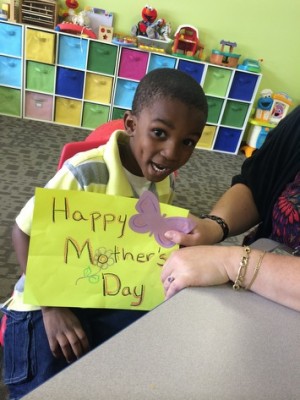Living with autism
The blessed life of the Henson family
 During their son’s two-year checkup appointment, Lotoya and Rodney Henson expressed their concern regarding their child’s language development. Although he was extremely independent and would climb to get things he desired, Isaiah was still only using single words, pointing and whining as his primary form of communication. The pediatrician suggested Lotoya and Rodney contact Early Childhood Intervention Services.
During their son’s two-year checkup appointment, Lotoya and Rodney Henson expressed their concern regarding their child’s language development. Although he was extremely independent and would climb to get things he desired, Isaiah was still only using single words, pointing and whining as his primary form of communication. The pediatrician suggested Lotoya and Rodney contact Early Childhood Intervention Services.
Over the following months, Isaiah began to show the classic signs of Autism: regression of previously acquired skills, repetitive drumming, hand stemming, staring into space for brief periods of time and desiring less social interaction. At the age of 3, Isaiah transferred from Early Childhood Services (ECI) to public school; it was there the Hensons were informed of the possibility of autism. By the age of 4 years old, Isaiah received an “official diagnosis.”
“Though I saw all the signs of autism, I did not desire the label of ‘autism,’” Lotoya said. “The onset shock was overwhelming. It was difficult at times to mask my emotional state. I would take tearful breaks, relying heavily on the foundation of my faith. When telling others about the diagnosis, tears began to flow before my thoughts could gather their full explanation. This is where I believe that the cycle of grief began.”
Lotoya did not grieve because she didn’t love and accept her son as he was, but because she knew that she had to face a new reality. Things would never be “normal;” the symptoms would not go away with short-term, “intensive therapy.”
“This now would be a possible life-long journey and the son I dreamed of would be different with limited, ‘normal’ moments in time,” Lotoya said. “I went into survival mode by focusing on the only thing that I had control over: the ability to learn, share, develop, grow and strategize to ensure that our son received the best care available. I let myself grieve through acquiring knowledge. I lived in a fog of hope.”
Other members in Lotoya’s family had autism. She said that experience helped her appreciate that not every person with autism is alike.
“The one significant thing that I have learned is that not all people with autism are the same,” Lotoya said. “Some kids are nonverbal with limited behavioral concerns, while others are highly verbal and creative, but have difficulty with sensory and other needs. The statement is true: ‘If you’ve seen one person with autism, you’ve seen only one.’ "
 Isaiah is 5 years old today. Lotoya said his smile is special because of a dimple in his cheek that “lights up a room.” Isaiah loves to give long hugs, kisses on the check, and a good tickle.
Isaiah is 5 years old today. Lotoya said his smile is special because of a dimple in his cheek that “lights up a room.” Isaiah loves to give long hugs, kisses on the check, and a good tickle.
“Anyone who meets him is consumed with the joy on his face and the twinkle in his eye,” Lotoya said. “The stress melts away when he meets me at the door after coming home from a long day at work.” Right now, in addition to public school, Isaiah attends Easter Seals North Texas Autism Treatment Program four days a week.
Lotoya also credits Cook Children’s, and specifically Deborah Vert, D.O., for helping her through some of the tougher times while raising Isaiah. The medical center gave her an avenue to share her experience and ideas, and to help better serve families through the Family Advisory Committee and the Autism Patient Safety Committee.
“Cook Children’s has helped our family by providing specialized therapists who are compassionate toward the needs of both the child and caregiver,” Latoya said. “They were very patient, accepting of my endless questions, suggestions and various training that I would acquire over the years. Isaiah’s plan of care was always individualized to his skillset and needs. Adaption and flexibility were at the core, and exemplified quality care.”
Currently, Lotoya helps families by sharing her experiences, assisting with the navigation of services (applied behavior analysis, occupational therapy, speech, etc.), providing encouragement and sharing resources and training material.
“This gave me a sense of purpose and a way to turn ‘lemons into lemonade’ and see the blessing in what others see as pain,” she said.
By providing guidance for strategic planning, parents get a sense of power and hope, instead of helplessness. Lotoya encouraged that all parents should ACT: Assess the situation; Call someone if life seems to become emotionally overwhelming; Take the lead as the coach of your child’s care team through acquiring knowledge.
Looking at life through the lens of autism has reminded Lotoya what life is really about.
“I was so career minded that I missed out on the essence of life itself,” she said. “I have learned how simple life really is. My mind had to be re-conditioned to not always be in control. I now strive to be selfless on a day-to-day basis; though I have not yet arrived.”
